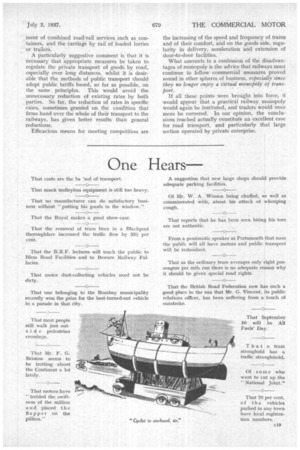One Hears .
Page 65

If you've noticed an error in this article please click here to report it so we can fix it.
That costs are the be 'aui of transport.
That much trolleybus equipment is still too heavy.
That no manufacturer can do satisfactory business without "putting his goods in the window." — That the Royal makes a good show-case.
That the removal of tram lines in a Blackpool thoroughfare increased the traffic flow by 33h per cent.
That the B.R.F. lectures will teach the public to " Bless Road Facilities and to Beware Railway Fallacies.
That motor dust-collecting vehicles need not be dirty.
That one belonging to the Bombay municipality recently won the prize for the best-turned-out vehicle in a parade in that city.
That most people still walk just• outside pedestrian crosSings.
That Mr, F. G. Bristow seems to be trotting about the Continent a lot lately.
That motors have "trebled the swiftness of the million and placed the flapper on the
A suggestion that new large shops should provide adequate parking facilities.
Of Mr. W. A. Willson being chaffed, as well as commiserated with, about his attack of whooping cough.
That reports that he has been seen biting his toes are not authentic.
From a pessimistic speaker at Portsmouth that soon the public will all have motors and public transport will be redundant.
That as the ordinary tram averages only eight passengers per mile run there is no adequate reason why it should be given special road rights.
That the British Road Federation now has such a good place in the sun that Mr. G. Vincent, its public relations officer, has been suffering from a touch of sunstroke.
• That September 10 will be All Fuels' Day.
T hat a tram stronghold has a traffic stranglehold.
Of some who want to cut up the "National Joint."
That 70 per cent. of the vehicles parked in any town have local registration numbers.




















































































































































